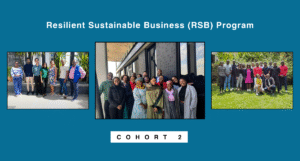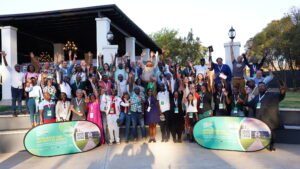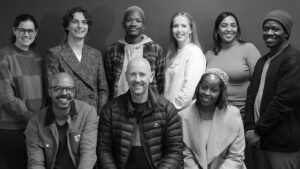By Samuele Tini, Host of The Sustainability Journey podcast
This is part four of a six-part series on sustainable business practices in Africa. You can find part one here, part two here, part three here, and part four here.
We continue our journey to explore real sustainability business cases in Africa, in collaboration with B Lab Africa.
The World Tourism Organization defines sustainable tourism as “tourism that takes full account of its current and future economic, social and environmental impacts, addressing the needs of visitors, the industry, the environment and host communities” (UN, 2024). It is critical for development and part of the key objectives within SDG 8, inclusive and sustainable growth.
However, tourism also has its downside; the term sustainable tourism often sounds like an oxymoron. In fact, despite being one of the largest industries on the planet and, therefore its potential positive impacts, its degrading effects are well known, mainly the massification of tourist destinations and the damage this causes (Palacios-Florencio et al., 2021), both socially and environmentally. Sustainable tourism has the potential to contribute to development, job creation and social inclusion (for a literature review on sustainable tourism Zolfani et al., 2015 and Guo et al., 2019).
In Kenya, one of the iconic areas for tourists is the Masai Mara National Reserve. It is one of the hotspots for tourism and one of the biggest earners for the country. However, the risk of what a recent article called “aggressive tourism” cannot be overlooked. (Cramer and Christ, 2023) The massive influx of tourists and the proliferation of camps can prove fatal for an ecosystem already fragile under the threats of an increasing population, climate change and environmental degradation. And the challenges have started to take a toll, with a drastic reduction on the overall wildlife population from 1977 (Ogutu et al., 2011), leaving this hotspot of biodiversity even more fragile and in need of protection from rising threats. However there are also positive initiatives and work to reverse the trend, improve drivers’ etiquette and conserve this pristine biodiversity spot. The Masai Mara National Reserve Management Plan (2023-2032) and the Greater Masai Mara Ecosystem Management Plan (2023-2032) have identified strategies and bring on board all stakeholders to preserve and restore the reserve.
And in this critical ecosystem, there is a certified B Corporation which is breaking the status quo and trying to create a sustainable model, Emboo River Camp.
Emboo is a Masai word that means pride, group, connecting with the pride of lions and community togetherness. Emboo is part of the small but vibrant community of B Corps in Africa.
We have sat with one co-founder, Valery Joanne Super. A former lawyer turned entrepreneur, she started the journey after some safari experiences, where she noticed the gaps in sustainability and innovation and their potential “was not fully embraced in the places where we went to”. Valery and her other co-founder, Loic Amado, never had experience in the field, but this fresh perspective helped them go the extra mile, as she puts it.
In 2019, they took over a previous camp in the Masai Mara National Reserve and built sustainability in every aspect. They first recognized the need for clean power, rather than the traditional generators, a quick win often overlooked. From there, they turned to sourcing, creating a hydroponic garden to provide fresh vegetables to guests. Another distinctive innovation is the use of only EV safari vehicles after converting all their traditional ICE vehicles. The use of EVs is often the most visible selling point for the camp, since it is an almost unique experience in the country and such a distinctive one, from the traditional smoky safari 4×4.
However, sustainability does not stop with electric safari vehicles. In fact, Emboo’s overall objective is to create an innovation hub for sustainability, which brings together entrepreneurs and innovations from around the continent in an effort to address climate change and which offers solutions for businesses and homes in the savanna and beyond. Emboo’s sustainable setup is now on display in Nairobi, where they renovated the Belgian Embassy and Residence to be net zero.
Beyond solar and EV, water is fully filtered and recycled, and beeswax clothes and bamboo straws are used as substitutes for plastic. Cooking is done using biogas, avoiding fossil fuels.
And they wanted to signal their practices and purpose. The camp is locally certified as Gold by Ecotourism Kenya and it is a member of Regenerative travel.
But they did not stop there and went for the more holistic B Corp certification, “we chose B Corp because it’s such a well-known international standard”.
The certification has enhanced their credibility and helped them strengthen their business. Valery points out the formalization of policies and practices that, as a startup, they had put into practice and now had to put on paper for the audit process. The business case of sustainability is also solid. Valery pointed out a Return on Investment for the sustainability practices of just 3 years and together with her Sales and Marketing manager, Judy Ndiritu, declared that “Being a B Corp certified…has definitely gotten more bookings”.
On the social side the business has developed a strong relationship with the community, a key stakeholder. Apart from traditional CSR activities and support to local projects like the Mara Elephant Project, they are actively recruiting from the community and embracing gender equality and diversity in their workforce. “We have a wonderful team which has men and women in every type of role, in every type of management level” and this is a decisive shift from the traditional male dominated sector. For example, Emboo River has women as safari guides, maintenance manager, security guard, chefs and other roles. As an anecdote Valery recalls how during the first years of the camp she was receiving requests for jobs mainly from males, but now she is receiving many from women in the community. In fact she argues Emboo is “really known for being a good location for women”.
They have fostered collaboration with sustainable businesses as suppliers. Greenspoon, a B Corp in Kenya and Spring Valley coffee, another B Corp are among the key suppliers.
The company’s objective is to become a sustainable one, currently focused on tourism but which might expand to other areas.
The case study clearly demonstrates the strong business case for sustainability, with a high return on investment, and shows how a business can integrate sustainability even in remote and traditional sectors like the safari one, in a critically endangered setting.
illuminem Voices is a democratic space presenting the thoughts and opinions of leading Sustainability & Energy writers, their opinions do not necessarily represent those of illuminem.
References
Cramer, M. & Christ, C. (2023) [online]
Guo, Y., Jiang, J., & Li, S. (2019). A sustainable tourism policy research review. Sustainability, 11(11), 3187.
Ogutu, J. O., Owen‐Smith, N., Piepho, H. ‐P ., & Said, M. Y.. (2011). Continuing wildlife population declines and range contraction in the Mara region of Kenya during 1977–2009. Journal of Zoology, 285(2), 99–109
UN (2024), Sustainable Tourism [online]
Palacios-Florencio, B., Santos-Roldán, L., Berbel-Pineda, J. M., & Castillo-Canalejo, A. M.. (2021). Sustainable Tourism as a Driving force of the Tourism Industry in a Post-Covid-19 Scenario. Social Indicators Research, 158(3), 991–1011
Zolfani, S. H., Sedaghat, M., Maknoon, R., & Zavadskas, E. K. (2015). Sustainable tourism: a comprehensive literature review on frameworks and applications. Economic research-Ekonomska istraživanja, 28(1), 1-30.




